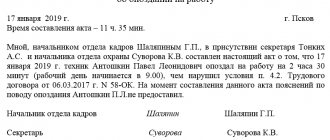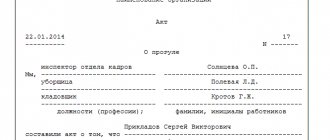What is lateness according to the Labor Code of the Russian Federation?
If an employee is not present before 4 o'clock , this can be called lateness . If he is gone longer , they talk about absenteeism . However, absenteeism can be counted if the total duration of the shift is less than 4 hours and the delay was only 2-3 hours.
Examples of delays include:
- absence of the employee at the time when the working day should begin;
- late return after the end of the meal break;
- leaving work early without warning your superiors;
By signing an employment contract, an employee agrees to perform certain duties.
Recording absenteeism or tardiness can be carried out in several ways, for example, according to data recorded in an electronic pass system or physical check of the presence of employees on site . , a report must be drawn up showing exactly who was late and for how long. The employee gets acquainted with the act and draws up an explanatory note in which he describes what caused him to be delayed on the way to work.
The Labor Code of the Russian Federation does not contain the term “lateness”. That is, formally, even a minute delay can be interpreted as a violation of labor regulations. Therefore, managers usually decide for themselves what delay can be considered late.
Often a short delay is allowed , for example, 10-15 minutes. Most often, such delays are not punished: management prefers to limit themselves to a verbal reprimand or warning . Serious penalties may follow if violations of labor discipline occur on a regular basis.
Important! You cannot first reprimand an employee and then fire him as a result of an isolated incident.
How is it different from truancy?
Each organization has internal rules that stipulate working hours, as well as the period of employment of each employee. If a person does not have a personal schedule, then he must appear at a certain time.
A delay of up to 4 hours qualifies as late. If a person is absent for more than 4 hours, they say that he missed a day of work. Absenteeism can be punished by dismissal - a measure provided for by the Labor Code of the Russian Federation.
Dismissal for being late for work is considered illegal if it happens once . Dismissal of an employee is possible only if there are systematic delays to work without extenuating circumstances for a long time . According to Article 81 of the Labor Code of the Russian Federation, a decision on dismissal can be made even after a single absence from work without good reason.
As in the case of delay, a truancy report is drawn up. The employee must explain in writing why he did not show up for work. If he refuses this, the manager draws up an act of refusal to provide explanations.
Many tolerant of short delays by employees . But if delays occur too often, penalties .
Valid reasons for being late
There is not a word in the legislation about valid and unexcusable reasons for being late. As a rule, the first include reasons that arose through no fault of yours:
- Natural disasters;
- Utility accidents;
- Death of people close to you;
- Diseases;
- Traffic accidents with your participation and the like.
If you do not have convincing evidence, then you can use the help of witnesses who are able to fully confirm all your words. By the way, traffic jams are not a valid reason. You could have taken a different route, gotten up earlier, and so on.
I would like to note that traffic jams are the most common reason for employees being late. The problem is especially pressing in cities with a population of over a million. If suddenly a traffic jam occurs as a result of an accident, but without your participation, then it makes sense to try your luck at the traffic police to obtain a certificate. However, not everyone is given it and not always. And this document does not have any special power.
There are also companies where there is no schedule. If he wanted to, he came at one o’clock in the afternoon, but if he didn’t, it had been like this since the very morning. Efficiency here is assessed not by the number of hours spent at the workplace, but by specific results. The project needs to be closed by the 12th of this month - closed. This is the result. It doesn’t matter whether 2 or 20 hours were spent on it.
Photo: pixabay.com
What penalties are provided?
Due to the fact that failure to show up for work at the start of a shift is not a serious violation, the punishment for it can only be disciplinary:
- remark (in case of a one-time delay);
- reprimand (if there were 2 or more offenses);
- severe reprimand (violations are systematic);
- dismissal (constant delays in the absence of reasons that could be considered valid).
Attention! If an employee can provide evidence that he was unable to arrive at work on time for a serious reason, no disciplinary punishment will be imposed.
Comment
A reprimand is the least severe type of punishment for an employee’s misconduct. It can be expressed either orally or in writing e. A remark is limited if the employee managed to convince his superiors that the reasons for the delay are valid. The reprimand is applied within six months after the incident or within a month from the moment of its discovery.
Rebuke
A reprimand is a more serious punishment than a reprimand. In many workplaces, having multiple reprimands is a good reason to consider dismissal.
The reprimand is displayed in writing in the employee's personal file .
The reprimand is issued according to the following algorithm:
- drawing up the relevant act ;
- receiving a letter of explanation from the employee;
- deciding on punishment. For example, if it is recognized that the reason was valid, and the employee confirms this with documents, no reprimand will be issued;
- drawing up an order to issue a reprimand , familiarizing the employee with the order within three days.
Employer's procedure
In order to hold a citizen in legal relations with an enterprise accountable, the employer must act clearly in accordance with the established procedure in business practice. In particular, full compliance with the procedure established in stat. 193 Labor Code of Russia.
Recording lateness
The Labor Code establishes the possibility of dismissing a person only for absenteeism, but not for a delay of a few minutes - theoretically, a citizen can take advantage of this “loophole” in the law, simply by not allowing himself to be absent for more than 4 hours in a row, while doing this systematically. To avoid this, the company should act as follows:
- Drawing up by the immediate superior of an employee who is always late a memo addressed to the head of the organization, that is, proper recording of violations of internal regulations.
- Request by the employer for written explanations from the citizen.
- Making a decision on the application or non-application of a remark or reprimand on the basis of an explanatory statement about the validity or lack thereof of the reasons that led to the delay in appearing at the workplace.
- Issuance of an order imposing punishment.
- Waiting for the citizen to be late for work again.
- Recording a violation in accordance with the above procedure.
- Registration of dismissal under clause 5 of Art. 81 of the Labor Code of the Russian Federation - as for the systematic failure by the worker to fulfill his duties in accordance with the contract.
Explanation of reasons
The employer must require his employee to state in writing why the delay occurred. The worker is given exactly 2 days to submit this document (from the moment the request is submitted). If it has not been submitted, a corresponding act is drawn up. It must be signed by at least 2 employees of this enterprise.
Attention! The employer’s ability to impose an appropriate penalty – a reprimand or reprimand – does not in any way depend on the fact whether a citizen gives an explanation or not.
Registration of collection
A reprimand or reprimand is formalized by order of the head of the enterprise in which the offending person works. Compilation is carried out in free form (or on a form approved by the organization).
It is mandatory that the guilty person be notified of the appropriate sanctions within 3 working days after the order is issued. If the worker refuses to familiarize himself, then a report is drawn up.
Can you be fired for being late?
Dismissal is possible if an employee systematically fails to arrive on time or refuses to give an explanation describing the reasons for the delay. An entry is made in the labor stating that the decision to dismiss the employee was made due to the fact that he neglected to comply with the rules of labor discipline.
To avoid dismissal, you must:
- try to warn colleagues or management about the delay;
- prepare documents confirming that the reasons for late attendance at work are valid (certificate from the Housing Office, certificate from a medical institution, etc.);
- As quickly as possible, provide management with an explanatory note describing the reasons for the delay.
Important! If an employee submits false documents that prove a valid reason for the delay, he may be fired and face criminal charges.
What actions to take if you are late
If it is not possible to get to your workplace on time, it is important to follow some rules. It is not advisable to lie about the reason for being late.
Under no circumstances should you provide false certificates or other written excuses that do not correspond to reality. The authenticity of documents is easily verified. An employee caught in such a deception will most likely be fired. In addition, consequences (including criminal punishment) may also affect the person who issued the certificate.
The following actions will help to reduce sanctions to a minimum and avoid serious punishment:
- Warning the boss about a possible delay;
- Worry about the evidence base for a valid reason for being late (certificate from the hospital, housing office, etc.);
- At the request of your superiors, write an explanatory note explaining the reasons for the action. All certificates justifying the delay are attached to the note.
Whatever the reason for absence from work, it is important to understand that this is a disciplinary violation. The best way out of the situation is to resolve the issue peacefully with the employer by agreeing to work at lunchtime or after the end of the working day. The first notice of a violation should be a signal for the employee to be more attentive to the work routine.
Which article of the Labor Code of the Russian Federation is supported by
Penalties that a manager can apply to an employee who frequently violates labor discipline are prescribed in Article 192 of the Labor Code of the Russian Federation. Measures such as reprimands (with or without entry into a personal file), reprimand and even dismissal are expected. According to Article 81 of the Labor Code of the Russian Federation, dismissal can be punished in the event of a single absence from work. However, it is impossible to fire someone for one delay .
How late can one be fired by law?
According to Russian law, an employee can be fired after three absences. Termination of an employment contract is carried out according to a certain algorithm. For the first delay, a reprimand is issued, after which a reprimand follows, and only after the third absence is dismissal possible with a note in the work book “For violation of labor discipline.”
Reference! If the employer considers that the employee’s oral explanations about the reasons for being late and the documents provided by him are sufficient, an explanatory letter may not be drawn up.
When delay is not punishable
Responsibilities are performed according to the rules of the employer, who establishes the working regime in the organization. Signing an employment contract is an agreement to comply with labor regulations. If the contract was not signed, it is considered that the employee was not introduced to the rules of the organization, which means that his absence for any period cannot be considered late or absenteeism .
Dismissal is also impossible if it was not possible to document that the employee actually violated the company’s rules and was absent from the workplace.
The application of penalties for systematic absence from work during working hours is not the responsibility of management, but it is not prohibited by the Labor Code of the Russian Federation. The Labor Code of the Russian Federation does not stipulate what reasons for being late can be considered valid. Therefore, the degree of “respect” is determined by the employer himself.
As a rule, valid reasons include those that a person could not influence, for example:
- disruption of public transport, for example, due to an emergency or weather conditions;
- natural disasters;
- sudden deterioration in condition due to illness;
- death or illness of a close relative.
The manager has the right to demand documentary evidence of the reasons for the delay. In this case, you can present a certificate from a medical institution, a recording from a video recorder, etc.
Important! The manager does not have the right to reduce the salary or impose a fine for being late. If this happens, the organization's management can be held administratively liable.
What counts?
It is necessary to combat the lack of punctuality of employees, because it is directly related to labor productivity in the organization. However, to understand how to punish such a disciplinary offense, you first need to decide what it is.
Lateness is considered to be an employee’s failure to arrive at work on time. It is not an independent regulatory category, therefore the enterprise has the right to set its time period at its discretion.
According to Article 81, an employer can immediately dismiss an employee for absenteeism - absence from work for four hours or more. We can conclude that being late is considered a situation when an employee is absent from his assigned place for less than four hours.
In order to accuse a person of non-compliance with labor discipline, when hiring him, he must be familiar with the internal regulations of the organization against receipt.
If constant travel is an integral part of the job, it is necessary to determine in advance in the job description the time that the employee will use for personal purposes, for travel and for performing official duties.
All nuances about an employee’s late appearance at work must be documented, otherwise in the event of a dispute, he will be legally correct. This may happen if the proceedings go to court.
Step-by-step instructions on how to fire a late worker
According to Article 192 of the Labor Code of the Russian Federation, a manager does not have the right to fire an employee for being late once. A decision on dismissal can only be made on the basis of repeated violations, provided that evidence of valid reasons for the delays is not provided. Below are step-by-step instructions on how to fire or punish an employee for being late:
- in case of a one-time delay at work, the employee writes a letter to his superiors, in which he describes the reason for his misconduct, attaching documents proving that he was forced to violate discipline;
- if an explanatory statement is not provided within 48 hours, a Statement of Refusal of Explanations is drawn up;
- if the employee fails to prove that the reason for the violation was valid, a corresponding act is drawn up and signed by two witnesses;
- the manager sets a date for the debriefing, to which all involved are invited;
- after the analysis, an order is drawn up, which reflects the sanctions applied to the latecomer. The manager is obliged to familiarize the employee with this order within three days.
This creates two violations. In the third case, it is possible to fire someone for systematically being late for work, that is, regular violations of labor discipline.
The following mistakes are often made when filing a dismissal:
- the employee is fired after three violations, and there are no documents confirming the first two;
- at least one out of three delays occurred for a valid reason, and the employee provided evidence of this fact;
- more than 12 months have passed between delays;
- the employer summed up the time of all lateness and classified them as absenteeism.
Attention! The employer has the right to apply punishment within six months after the violation. After 12 months, penalties are canceled.
If the delay lasts more than four hours in a row
A delay that lasted more than 4 hours is considered absenteeism. Absenteeism is understood as a serious violation of discipline and the employer has every right to dismiss a person even if he does not show up for work once.
Dismissal occurs according to the following algorithm:
- preparation of documents that confirm the fact of misconduct;
- preparing a dismissal order;
- familiarization of the violator with the order. Three working days are given for this .
Reference! Despite the fact that management has the right to fire an employee for absenteeism, in practice this rarely happens. Much more often, management confines itself to a written reprimand. Dismissal occurs in case of repeated violations or if previous disciplinary sanctions do not give the desired result.
Punishment
In Russia there is a myth that it is possible to be late for work within 15 minutes. Allegedly, this is not recorded or punished in any way. However, if the company adheres to a strict daily routine and values punctuality, even showing up at work a few minutes later than the specified time is fraught with litigation.
The Labor Code has several options for influencing unpunctual workers:
- comment;
- rebuke;
- dismissal.
Each method is used depending on the specifics of a particular case. Obviously, no one is going to fire a qualified specialist for being late once. It is illegal.
One time a reprimand is made, two times a reprimand. If an employee is regularly late, the employer has every right to terminate his employment contract (Article 192).
The Labor Code applies the wording “the employer has the right” to these measures. This means that the actions are advisory and not mandatory. In other words, management has the right to decide for itself whether to punish an employee or leave a disciplinary offense without attention.
It is important to remember that the Labor Code does not provide for the application of penalties due to lateness. If a boss uses such a method, he faces administrative liability.
In this case, the employee can be deprived of a bonus for being late if this measure is provided for in the employment contract.
Arbitrage practice
A dismissed employee has the right to go to court and demand that the employer's decision be challenged. He must prove that the termination of the employment contract occurred illegally, for example, he was late for reasons that he had no control over and has the opportunity to prove it. If the court finds that the dismissal was illegal, the employee must be reinstated.
Attention! Disciplinary punishment can be lifted early if the employee has stopped violating labor discipline and has become more disciplined after the first reprimand.









